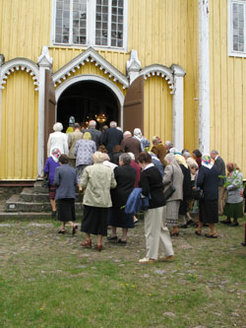The Catholic Church and Religious Pluralism in Lithuania and Poland: An Anthropological Study of Public and Private Meanings of Religion in Postsocialist Society
The research is conducted in paired Lithuanian and Polish communities – an urban center and a village – and approaches the impact of Catholicism on people’s everyday lives from three perspectives that have a long tradition in anthropology: (a) the domain of society and the public sphere, i.e., the interrelations of the Church with state and local networks of power and the impact of the Church on public discourse; (b) the domain of institutions, i.e., the relevance of churches and religious communities as foci of everyday social activities, as generators of collective identity and difference; and (c) the domain of the individual, i.e., individual perceptions of the role of the Church in society, Catholicism as a source of individuals’ beliefs and moral values vis-à-vis other sources of such convictions based on different religious or secular ideologies, and as a source of social capital. The data collected will provide material to assess the role of the Catholic Church in the two countries and to explain the different trajectories Catholicism has taken. In selecting the sites and groups of research participants, we have chosen to focus on the closely related parameters of residence and class as the key differences in postsocialist societies.

The Catholic Church and Religious Pluralism in Lithuania and Poland: An Anthropological Study of Public and Private Meanings of Religion in Postsocialist Society
Particular attention is paid to the careful coordination of research activities in order to achieve results suitable for comparison across the field sites. The methods used will be mainly ethnographic, based on participant observation and interviews conducted with members of a core research population and representatives of the Catholic Church and other religious communities, complemented by the analysis of written sources and visual media.
The project’s results are expected to provide both scholars and policymakers with a more sophisticated view of the role of the Catholic Church and the Christian faith in the transformation processes of Eastern Europe. Moreover, they will enhance knowledge of the social mechanisms through which western notions of pluralism are taking hold in formerly socialist countries. To policymakers in Lithuania and Poland as well as representatives of the European Union, international organizations and NGOs, the project will provide insights and data on how religion functions in shaping people’s moral convictions and everyday lives and how western liberal-democratic values like pluralism are perceived by the urban middle class, on the one hand, which plays a particularly important role in the countries’ transition, and by rural populations, considered to be much more conservative and disadvantaged by the postsocialist transformation, on the other.
Special importance is attached to cooperation with East European academic institutions and the training of graduate students. This will be realized through PhD supervision and the organization of workshops and conferences. The project will facilitate a regular exchange between German and East European scholars and students, increased opportunities for the study of East European societies in German anthropology and avenues to gaining international experience for Lithuanian and Polish students.
Individual projects

Ingo Schröder investigates the impact of Catholic hegemony on middle-class lives in the city of Kaunas. Among this population, faithful observance of the church’s teachings cannot be taken for granted. Catholicism faces an increasing competition from various kinds of individual spiritual bricolage and religious indifference. Research focuses on individual and public negotiations of the relevance of the Catholic Church in contemporary Lithuanian society.
Lina Pranaityte’s research focuses on the interaction of laypeople and the Catholic Church in a Lithuanian village in the Varena district, in particular on the transformations of different forms of capital in exchange practices. By re-evaluating contributions (donations, payment for religious rituals) to the church, the perception of Catholicism in general and of the church as an institution in rural Lithuania is analyzed.
Kinga Sekerdej conducts research on women and the public role of the Catholic Church in urban Poland. She examines how women that are active in religious associations relate to the gender-specific messages of the Church. Furthermore, she asks whether such religious activity has implications for civic engagement in community matters. Her research focuses on a right-wing Catholic association and an elite liberal Catholic group in Kraków.
Agnieszka Pasieka studies the Catholic Church’s influence on both actual and potential religious pluralism in Poland in the district of Ujscie Gorlickie (Malopolska region), which is inhabited by Roman Catholics, Greek Catholics, and Orthodox. She investigates religion at the intersection of private and public spheres, primarily from the perspective of women. Women’s activities in the local civil society, on the one hand, and their connection with religiosity, on the other, constitute the main foci of her research.

